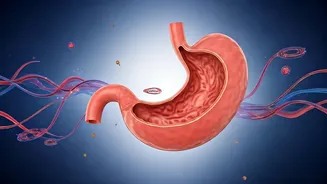Stress and Appetite
Stress, a common facet of modern life, significantly influences our eating habits. When you're stressed, your body releases cortisol, often dubbed the
"stress hormone." Elevated cortisol levels can trigger an increased appetite, particularly for high-calorie, sugary, or fatty foods. This response is a survival mechanism; your body perceives stress as a threat and craves quick energy sources to combat it. This can lead to overeating and weight gain. Managing stress through techniques like mindfulness, meditation, or regular exercise can help regulate cortisol levels and reduce the likelihood of stress-induced cravings. Making conscious food choices and planning meals can also mitigate the effects of stress on your appetite, allowing you to maintain better control over your eating habits and overall health.
Cortisol's Impact Unveiled
Cortisol plays a critical role in the complex interplay between stress and appetite. The release of cortisol not only increases your appetite but also affects where your body stores fat. High cortisol levels often lead to increased fat storage in the abdominal area, increasing the risk of various health problems. Furthermore, the constant presence of cortisol can disrupt your body's natural hunger cues, making it difficult to differentiate between true hunger and emotional cravings. This disruption can result in a cycle of stress, overeating, and further weight gain. Practicing stress-reduction techniques and maintaining a balanced diet helps to reduce cortisol levels, helping to improve metabolism, and restore your body’s natural appetite regulation processes. This balance will boost your chances of maintaining a healthy weight and overall well-being.
Premenopause's Influence
Premenopause, the transition period before menopause, also brings hormonal shifts that affect your eating behaviors and weight. Fluctuating estrogen levels during this phase can influence your metabolism, appetite, and body fat distribution. Many women experience increased cravings, changes in food preferences, and alterations in how their bodies process food. These changes may lead to weight gain, particularly around the midsection. Women can mitigate the impact of hormonal fluctuations by adopting a balanced diet, including nutrient-rich foods that provide sustained energy. Regular exercise, particularly strength training, is crucial for maintaining muscle mass, which helps boost metabolism. Prioritizing quality sleep and managing stress can also help regulate hormones, supporting a healthier weight and overall well-being during premenopause and beyond.
Muscle Mass and Metabolism
Muscle mass is a key player in how your body uses energy, affecting how quickly you burn calories. As you age, or during hormonal shifts like premenopause, you might lose muscle mass, which can decrease your metabolism. This slowdown means your body burns fewer calories at rest, making it easier to gain weight. Furthermore, a decline in muscle mass can affect insulin sensitivity. This means that your body may become less effective at using insulin to regulate blood sugar levels. Strength training and adequate protein intake are important strategies to preserve and even increase muscle mass. Strength training stimulates muscle growth and boosts metabolism, while a protein-rich diet provides the building blocks for muscle repair and growth. Regular physical activity, combined with a balanced diet, helps maintain a healthy metabolism and supports weight management during times of hormonal shifts.
Hormones and Metabolism
Hormonal fluctuations, particularly estrogen and progesterone, play a crucial role in how your metabolism works. These hormones influence how your body uses energy, where it stores fat, and your appetite. When hormones fluctuate, such as during premenopause, it can disrupt your metabolism. Some women may experience a slower metabolism, making it easier to gain weight, and more difficult to lose it. Estrogen impacts appetite regulation. Progesterone may cause increased water retention and impact metabolism. Adopting a lifestyle that supports hormonal balance is important. This includes eating a balanced diet rich in whole foods, prioritizing sleep, managing stress, and engaging in regular physical activity. By taking steps to support hormone health, you can positively influence your metabolism and manage your weight more effectively.
Insulin Sensitivity Changes
Insulin sensitivity can be disrupted during periods of hormonal imbalance or metabolic changes. Insulin is a hormone that helps your body use glucose for energy, and impaired insulin sensitivity means your cells are less responsive to insulin. This can lead to higher blood sugar levels, increasing your risk of weight gain and other health issues. Poor diet choices, lack of physical activity, and increased stress contribute to decreased insulin sensitivity. Adopting lifestyle changes can help improve insulin sensitivity. This includes maintaining a balanced diet low in processed foods and refined carbohydrates, engaging in regular exercise, and managing stress. High-fiber foods, such as vegetables, fruits, and whole grains, can also slow down the absorption of glucose, helping to stabilize blood sugar levels. These steps are instrumental in preventing weight gain.
Sustainable Lifestyle Habits
Establishing a sustainable lifestyle is crucial for managing appetite, weight, and overall health. A sustainable approach involves long-term, consistent habits that you can maintain easily. This contrasts with quick-fix diets. The foundation of a sustainable lifestyle includes a balanced diet rich in whole foods, regular exercise, adequate sleep, and effective stress management techniques. Planning your meals and snacks can help you avoid impulsive unhealthy choices. Regular physical activity, particularly activities you enjoy, helps control your appetite. Managing stress through activities like yoga, meditation, or spending time in nature is also key. Sticking to sustainable habits will help you achieve long-term success in managing your appetite, body weight, and overall well-being.












